Month 1:8, Week 1:7, Year:Day 5945:8 AM
2Exodus 7/40
Gregorian Calendar: Sunday 21 March 2021
The Sabbath Before
Preparing the Passover Lamb
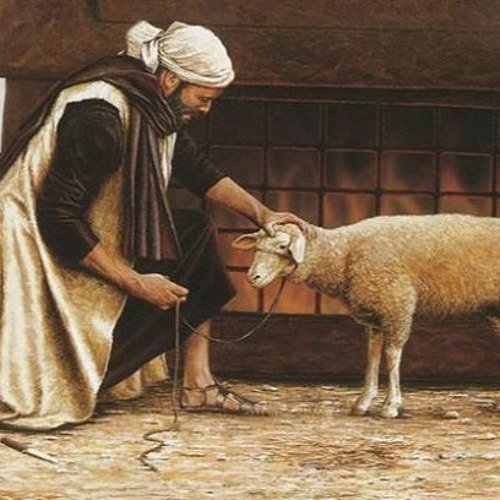
"A qadosh (holy, set-apart) people and a blameless race,
this she (Hochmah, Wisdom) delivered from a nation of oppressors.
She entered the soul of a servant of Yahweh (Moses),
and withstood fearsome kings with wonders and signs.
To the qodeshim (saints, set-apart ones) she gave the wages of their labours;
she led them by a marvelous road;
she herself was their shelter by day
and their starlight through the night.
She brought them across the Sea of Reeds (Yam Suf, Red Sea),
while she swallowed their enemies in the waves
and then spat them out from the depths of the abyss.
So the virtuous despoiled the godless;
Yahweh, they extolled Your qadosh (holy, set-apart) Name,
And with one accord praised Your protecting Hand,
for Hochmah (Wisdom) opened the mouths of the dumb
and gave speech to the tongues of babes"
(Wisdom 10:15-21, JB)
Introduction
With these thoughts as we stand at the end of the first week of the New Year and less than a week away from the spring festivals, I welcome you all to this assembly anf first sabbath of the year in Yah'shua's (Jesus') Name.
Selection of the Passover Lamb
In two days' time, on Aviv 10, according to the ancient covenant of Moses, the lamb for the Pesach or Passover was selected. This spotless lamb prefigured the spotless, sinless Son of Elohim (God) chosen to be the sacrifice or atonement for our sins.
Abraham's Prefigurement
Again, prefiguring this great event at the meridian of time, Abraham spoke words of comfort to Isaac his son who wondered why his father had brought no lamb in sacrifice to Mount Moriah, saying truthfully, though not knowing how, "My son, Elohim (God) will provide for Himself the lamb for a burnt offering" (Gen.22:8, NKJV). Abraham believed he would have to go through with the appalling deed of offering his own son, not understanding that what he was about to be shown was the love of a Father's heart for His own Son and for mankind. For in this moment of supreme sacrifice, to which we are all called at some point in our lives, was also the supreme contradiction to the finite mind - the mitzvah (commandment) to do the unthinkable, the most abhorrent to the righteous soul, and combined with that the emunah (faith) that Yahweh would somehow make it all right.
An Innocent Lamb
Lambs, you see, are rather special. They are innocent. All Abraham could say to his beloved son was, "My son, Elohim (God) will provide for Himself the lamb for a burnt offering" because part of him must have fervently hoped for - prayed for - a miracle, an absolution from doing the unthinkable, yet part of him was willing to go through with it, believing that Yahweh would raise his son up again from death.

Faithful to Commission But Praying for a Way Out Too
For thousands of years lovers of the Davar Elohim (Word of God) have tried to unpack that sentence, that great concatenation of events, feelings, loyalties, doubts, and faith, in order to get to the heart of what was happening in Abraham's soul, and in Isaac's for that matter too. Likewise each faithful person - each committed talmid (disciple) - who has tried to do the same thing - the right thing - when faced with apparent contradictions, has, in turn, told his or her own story of either faith or unfaith. We all have our Abrahamic test, I believe, to see if we will be loyal or not - to establish the full measure of our character.
The Book of Jasher
I don't know whether Isaac was prepared in advance for what was going to happen. We're not told, even though some imaginative writer somewhere between the 3rd and the 13th centuries AD penned a book on ethics, calling it the Book of Jasher, and claimed that Abraham fully revealed what was about to happen and that Isaac was a young man. But I do not believe that book is true myself on numerous grounds, a reason it rightly never found its was into the Tanakh (Old Testament) [1]. The very clear impression is that the boy was young.
The Abrahamic Sacrifice
Let us read the account of this event together in Genesis 22 (Evidence Bible - EB, p.34):
"Now it came to pass after these things that Elohim (God) tested Abraham, and said to him, 'Abraham!' And he said, 'Here I am.' And He said, 'Take now your son, your only son Isaac, whom you love, and go to the land of Moriah, and offer him there as a burnt offering on one of the mountains of which I shall tell you."
"So Abraham rose early in the morning and saddled his donkey, and took two of his young men with him, and Isaac his son; and he split the wood for the burnt offering, and arose and went to the place of which Elohim (God) had told him. Then on the third day Abraham lifted his eyes and saw the place afar off. And Abraham said to his young men, 'Stay here with the donkey; the lad and I will go yonder and worship, and we will come back to you.' So Abraham took the wood of the burnt offering and laid it on Isaac his son; and he took the fire in his hand, and a knife, and the two of them went together. But Isaac spoke to Abraham his father and said, 'My father!' And he said, 'Here I am, my son.' Then he said, 'Look, the fire and the wood, but where is the lamb for a burnt offering?' And Abraham said, 'My son, Elohim (God) will provide for Himself the lamb for a burnt offering.' So the two of them went together.
"Then they came to the place of which Elohim (God) had told him. And Abraham built an altar there and placed the wood in order; and he bound Isaac his son and laid him on the altar, upon the wood. And Abraham stretched out his hand and took the knife to slay his son. But the Malak (Angel) of Yahweh (the pre-incarnate Yah'shua/Jesus) called to him from heaven and said, 'Abraham, Abraham!' And he said, 'Here I am.' And He said, 'Do not lay your hand on the lad, or do anything to him; for now I know that you fear Elohim (God), since you have not withheld your son, your only son, from Me.' Then Abraham lifted his eyes and looked, and there behind him was a ram caught in a thicket by its horns. So Abraham went and took the ram, and offered it up for a burnt offering instead of his son. And Abraham called the name of the place, Yahweh-Will-Provide; as it is said to this day, 'In the Mount of Yahweh it shall be provided.'
"Then the Malak (Angel) of Yahweh called to Abraham a second time out of heaven, and said: 'By Myself I have sworn, says Yahweh, because you have done this thing, and have not withheld your son, your only son -- blessing I will bless you, and in multiplying I will multiply your descendants as the stars of the heaven and as the sand which is on the seashore; and your descendants shall possess the gate of their enemies. In your seed all the nations of the earth shall be blessed, because you have obeyed My voice.' So Abraham returned to his young men, and they rose and went together to Beersheba; and Abraham dwelt at Beersheba" (Gen.22:1-19, NKJV).
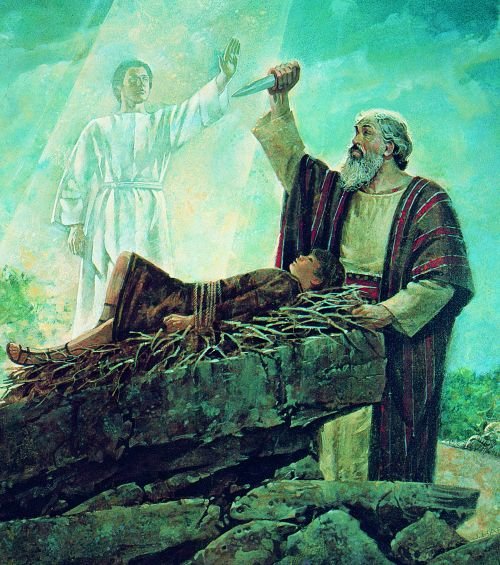
Did Abraham Know What Was Going to Happen?
You see, Abraham fully believed that he would have to go through with the grizzly act but he also believed that Yahweh would bring his boy back to life again, as Yahweh would indeed one day do with His own Son at Calvary. We will never fully unpack that sentence - "My son, Elohim (God) will provide for Himself the lamb for a burnt offering", because Yahweh alone knew the heart of Abraham, His friend. I do not believe he knew what was about to happen, else it would not have been a test. I believe these were words of assurance for Isaac, who trusted implicitly in his father, knowing him to be a godly man. Therefore we cannot judge this event - what went through Abraham's mind and heart, we can only imagine it through the lens of our own finitude, age (21st century) and limited experience, even if our emotions may be clamouring for answers.
Not My Will, But Yours
Yahweh also knows you and me, what we will accept and what we will refuse when it comes to our testing, for we too are innocent as Isaac, but we too are also knowing, and not knowing, having to walk by emunah (faith), as Abraham did. Yah'shua (Jesus) the son of man went through the same, and so certainly this decisive event was a choice - He was free to go to the cross or not as a human being like us. He said, in the Garden of Gethsemane:
"Father, if it is Your will, take this cup [of suffering and death] away from Me; nevertheless not My will, but Yours, be done" (Luke 22:42, NKJV).
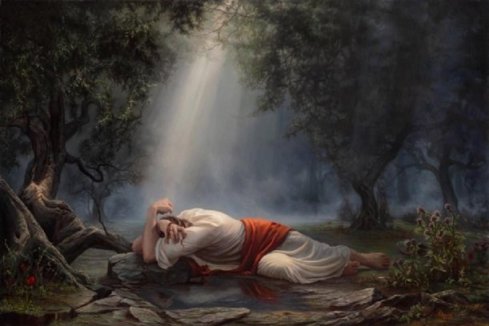
The Stolen Lamb
Many years later after this Moriah event with Abraham and Isaac, where the Jerusalem temple would one day stand and where Messiah would be crucified, a navi (prophet) of Yahweh told a king this story about another lamb, an innocent lamb:
"'There were two men in one city, one rich and the other poor. The rich man had exceedingly many flocks and herds. But the poor man had nothing, except one little ewe lamb which he had bought and nourished; and it grew up together with him and with his children. It ate of his own food and drank from his own cup and lay in his bosom; and it was like a daughter to him. And a traveler came to the rich man, who refused to take from his own flock and from his own herd to prepare one for the wayfaring man who had come to him; but he took the poor man's lamb and prepared it for the man who had come to him.' So [the king]'s anger was greatly aroused against the man, and he said to [the navi/prophet), 'As Yahweh lives, the man who has done this shall surely die! And he shall restore fourfold for the lamb, because he did this thing and because he had no pity.' Then [the navi/prophet] said to [the king], 'You are the man!'" (2 Sam.12:1-7, NKJV).
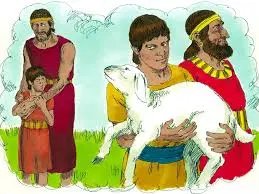
Nathan, David, Bathsheba and Uriah
The navi's (prophet's) name was Nathan and the king's name was David. The lamb's name was Bathsheba and the poor man's name was Uriah from whom the king not only stole his wife but murdered the man, her lawful husband. Then the king had two sons by the woman, one of whom died in childbirth, and the other who would succeed him as king, bringing him and Israel a mixture of blessings and cursings. That second child's name was Solomon. You all know the rest of the story.
We are a Mixed Bag of Flaws and Strengths
The problem is we are, every one of us, one or more of those five characters in life at different times too - the king possessing great power, the poor man who had little but who was loyal to the king, the poor man's one-and-only wife, the child of adultery that perished, the subsequent child that survived and came to do great things only to have an ignominious fall, and the navi (prophet) speaking emet (truth). At some time or another in our life we have been the criminal, the victim, the voice of conscience and speaker of emet (truth), the stolen bride, the aborted life and the life of mixed blessings and cursings. For you have in that story, which really happened, a replay of a drama in every life. The life of all of us is such a mixture, and that is why their are griefs and joys, trials and temptations, successes and disasters, unless we have walked really close to Elohim (God) and in obedience to His mitzvot (commandments). At some time in our life we have been, or will be, a Nathan, a David, a Bathsheba, a Uriah, a child who never was, and a Solomon full of wisdom one day and full of stupidity and apostacy the next.
The Curse on David for His Folly
We read on:
"Then Nathan said to David, 'You are the man (who stole the lamb)! Thus says Yahweh-Elohim of Israel: 'I anointed you king over Israel, and I delivered you from the hand of Saul. I gave you your master's house and your master's wives into your keeping, and gave you the house of Israel and Judah. And if that had been too little, I also would have given you much more! Why have you despised the mitzvah (commandment) of Yahweh, to do evil in His sight? You have killed Uriah the Hittite with the sword; you have taken his wife to be your wife, and have killed him with the sword of the people of Ammon. Now therefore, the sword shall never depart from your house, because you have despised Me, and have taken the wife of Uriah the Hittite to be your wife.' Thus says Yahweh: 'Behold, I will raise up adversity against you from your own house; and I will take your wives before your eyes and give them to your neighbour (his son Absalom who rebelled), and he shall lie with your wives in the sight of this sun. For you did it secretly, but I will do this thing before all Israel, before the sun'' So David said to Nathan, 'I have sinned against Yahweh.' And Nathan said to David, 'Yahweh also has put away your sin; you shall not die. However, because by this deed you have given great occasion to the enemies of Yahweh to blaspheme, the child also who is born to you shall surely die.' Then Nathan departed to his house" (2 Sam.12:7-15, NKJV),
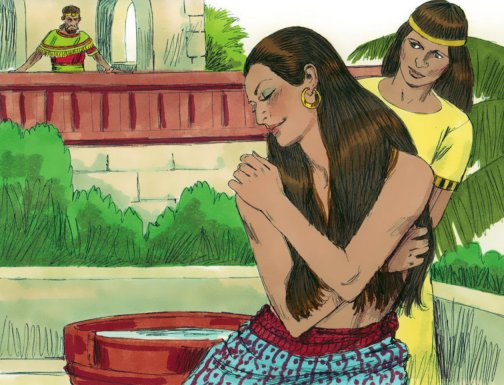 It all began with a lustful gaze and a refusal to honourably avert his eyes...
It all began with a lustful gaze and a refusal to honourably avert his eyes...
Why the Coming Passover Season?
The whole purpose of the Pesach (Passover) season that is nearly upon us is to confess sin and be done with it (during the seven days of Chag haMatazah/Unleavened Bread) by means of the innocent, spotless Passover Lamb, Yah'shua the Messiah (Jesus Christ). Anciently the people had to do this every year. But because of Yahweh's sacrifice of His own Son, one permanent, eternal sacrifice was made for all sins, to be followed by rising from the dead at Yom haBikkurim, the Firstfruits of the dead, which we also celebrate during this Passover Season, because this too is necessary to be fully redeemed from sin.
The Consequences
David the king sinned grievously but his heart was yet toward Yahweh and he repented immediately after being confronted and exposed, and with many, many tears. There were consequences for the many evils he did - failing to avert his eye from a naked woman who was not his, coveting what he saw, lusting after her, plotting and scheming to get her and then keep her, the final theft of the woman, followed by adultery, blame-shifting for the pregnancy and then, when all else failed, murder most foul at the hand of a mortal enemy, all the while blaspheming the Name of Yahweh before Israel as Israel's representative monarch...and these are but some of David's sins. The consequences of those sins followed him for the rest of his life, reverberating through Solomon and Israel's history.
Deal With Sin Early On
And that ought to be, at least on a selfish level, for us, motivation not to sin in the first place, not to be disobedient, not to justify our own carnal will, but inspire us to cut out the intent to do sin early on while it yet remains in the mind or heart, and before the hand of a man - our hand - can be raised to do evil in the world. Whatever we have have thought to do or actually have done, we have to deal with it, and quickly, otherwise that sin - those sins - will chase us like the hounds of hell for the rest of our lives, giving us no peace, no respite, no resting place, for Yahweh will not allow us to escape, nor will He allow His servants to blaspheme His Name.
 Repent quickly, sincerely and fully...
Repent quickly, sincerely and fully...
Wherever We Go, He is There
This same David confessed:
"If I ascend into heaven, You are there;
If I make my bed in Sheol (hell), behold, You are there [too]" (Ps.139:8, NKJV).
Do Not Look Back
Good or bad though our intents and deeds may, Yahweh will pursue us as a loving Father, to bless us or bring us back to the straight and narrow path through adversity. Whatever you do, don't waste your life in denial of sin or an unwillingness to repent of it. Admit it, confess it, receive the pardon so freely proffered to you through the expensively shed blood of the Eternal Passover Lamb at Calvary and then, once done, remember, do not look back. It's over, done.
Not Resenting Testing
Once Abraham was rescued by Yahweh from having to sacrifice his son, he never looked back again. He understood, praised Yahweh, and moved on. He did not resent the testing. One of the reasons people wallow in misery is because they feel compelled to keep looking back, swimming in the mire of real or imagined victimhood, reliving past traumas, or hurts, or bitternesses, or whatever. All the elements we need to get out of such a self-destructive rut are to be found in the story of David, Bathsheba and all those drawn into that terrible drama. We can, if we are not careful, over-analyse too, being as we are living in an age where psychotherapy has come to replace the Besorah (Gospel) and the solutions people seek are therefore in consequence never permanently resolved. Salvation and therapy are not the same thing. The thing is, you cannot walk away from sin, and expect its consequences to just go away over time. Whether as the perpetrator or the victim, without permanent resolution, it has to be fixed, and that is only possible supernaturally by the power of our loving Heavenly Father through His Son who generously effected that resolution in our behalf.
Not Better Than the Rest
In the passage which I introduced today's message, which is not, by the way, canonical Scripture but a quotation from the Apocryphal Wisdom of Solomon written not by Solomon but anonymously in the first century BC, things are somewhat idealised, which is what can sometimes make these non-canonical books dangerous. It begins with the words, "A holy people and a blameless race..." - and though it is true they were "holy...and...blameless" by a legal decree or court-room decision by Yahweh, what theologians called 'jurisdictional or court-room righteousness', I hope nobody believes Israel was sinless, because what happened both before and subsequent to the Exodus demonstrated they were just as wicked and sinful as that "nation of oppressors" they fled from. But this belief that they were 'better than the rest' was, and still is, one of the abominable sins of Israel, an attitude born of pride and arrogance, and a major historical cause of its recurrent apostacy and subsequent falls. Simply because Yahweh chooses to show some people grace - undeserved loving kindness - doesn't mean they are instrinsically good and have anything to boast about. Far from it. We all of us have that murderous and adulterous spirit that smote David in the flesh and it is up to us whether to crucify or cultivate it. That's a fact of life. That's the fleshy nature constantly at work in us, the realisation of which is supposed to keep us humble and squash all the foolishness of the pretentiousness at self-generating righteousness.
Repent Early
So long as we do not cultivate sinful behaviour, and so long as we cease being foolish lambs who insist on wandering off to do our 'own thing', we'll be fine. If we would just stay on the path instead of nurturing that sinful cluster of attitudes into maturity which then turns the lamb-nature into a prideful, aggressive sheep nature (another image used by Yahweh in scripture, incidentally, you know, the one with aggressive, dangerous horns on its head) - so long as we nip sin in the bud while its head- and heart-space is still shared by noble and pure impulses, as was the case with David - and repent speedily, then we will not waste our lives going around in circles repeating sinful behaviour over and over again to the hurt of both ourselves and those around us. Because if you don't resolve sin - if you refuse to repent - I guarantee you are going to end up hurting far more people than just yourself. And even should you lock yourself away in the metaphorical desert with the excuse that in doing so you won't be able to hurt people by your harmful behaviour because you have put distance between you and them, the truth is you will still be the author of anxiety and grief in those who love you and who want to see you delivered, safe and prospering. The 'hiding-away' routine is not a righteous thing to do at all, either to yourself or to those who care about you. And of course, suicide is the most hurtful, selfish and destructive thing to do of all, the 'final act', as it were. Notice that David did not run off and slit his throat or fall on his sword, which would have delighted Satan. He rather humbled himself and confessed in tears, something that pridefulness hates to do.
Deliverance is by Grace
So, no, Israel was not - never was, and never can be - a "blameless race" in her own strength even though she was indeed delivered; but that deliverance was because of divine unmerited favour, not because of any earned righteousness of her own. What saved her out of the oppressor's hand was her willingness, finally, to trust in Yahweh's deliverance, which we call emunah or faith - not armchair faith, but the kind of pro-active faith that leads to action such as we shall be recalling at Pesach (Passover) itself in a week's time. Though Israel trusted, there was still unresolved sin to be dealth with; and as you know the first generation, save a handful, refused to deal with it and had to die off and be replaced by a generation that was willing to live the right way, the Torah way. So, again, the writer of the Wisdom of Solomon didn't quite get it right when he said, "the virtuous despoiled the godless" because they - the Israelites - played no part in causing the plagues, parting the sea, or drowning Pharaoh's army. They just believed, got up and went where they were told to go. Yahweh did all the 'hard stuff', the things which bring the credits or glory, a reason we need to remember that our salvation - our deliverance from all the horrid consequences of sin - is always Yahweh's doing, not man's, and therefore we have nothing to boast of (Eph.2:9). Our doing is but to say 'yes', repent, change direction, take His hand and walk forwards toward the goal and live the ordained lifestyle in His strength and empowerment.
The Task Before Pesach
Our task before Pesach (Passover) arrives in a few days is to make sure that we are in right positioning with Yahweh - on our feet, facing the right direction, and willing to move off on command. We are not without our difficulties. We are oppressed, sometimes depressed, often weary, burdened by illness, by deaths; we are bottled in by lockdowns and depressed economies, financial difficulties, separated from loved ones often for long periods of time, and desperate to get out of our individual Egypts and from the various Pharaohs who either want us enslaved or dead. Some of our loved ones have already died, and are dying, and we too are distressed as others pass away. Many of you are experiencing persecution in evangelism and simply for being who you are as believers. The world is not such a friendly place to Christ's talmidim (disciples) and wicked governments are in power intent on snuffing the Gospel out, on proclaiming Caesar as Lord rather than Yah'shua (Jesus), and will not relent until Yahweh does to them and their corrupt rulers as He did to Egypt.
A Passover Season Like No Other
We are gathering once again to worship, pray and hear the Davar Elohim (Word of God) in six days' time. We have done this here for 25 years now, but this new Passover Season in the Roman year of 2021 is to be unlike any other we have had before. Why? Because this is, after years of talking and of prophesying, the year of Yahweh's Penultimate Judgment. The players - the protagonists and antagonists, friends and foes, are assembling for war, and all that has been spoken is unfolding right now. What we have done in the past is no longer enough. This time faith will be tried and tested, anointings will begin to come to those willing to surrender, love with grow, and new people will come to saving faith. A new field is about to be planted and harvested for the Kingdon.
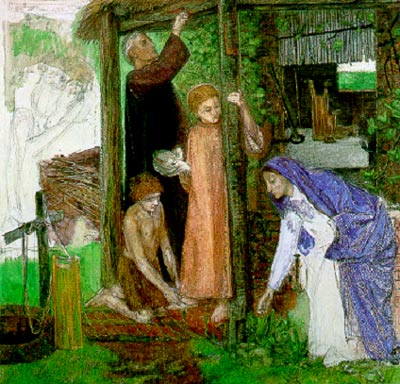
Approaching the Throne of Grace
And so we have to come before the Throne of Grace, as David did, at the very moment he was exposed by Nathan, at the very moment he pronounced his own judgment on himself. We too must be honest and deal with those things which beset us and trouble us. The old narratives we have constructed around our lives, for whatever reasons, have to be rewritten, narratives authored by Elohim (God) that set out who we are in Christ and what we are now called to do as Kingdom-builders. It's an exciting time, a time of great promise, but we must come to these spring festivals as to the House of Yahweh, in the spirit of the Psalmist, with worship and praise:
"Praise the name of the LORD;
Praise Him, O you servants of Yahweh!
You who stand in the House of Yahweh,
In the courts of the House of our Elohim (God),
Praise Yahweh, for Yahweh is good;
Sing praises to His name, for it is pleasant" (Ps.135:1-3, NKJV).
Conclusion
I look forward to seeing you at the sacred annual Pesach (Passover) meal in six days and for the remainder of the Passover Season festivities.
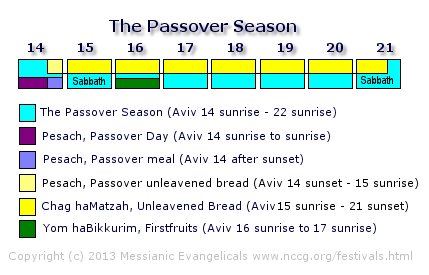
Until then, may blessings abundant be yours in Yah'shua's (Jesus') Name! Amen.
Continued in Part 2 (Pesach)
Endnotes
[1] See The Book of Jasher and the Sabbath Controversy
Further Reading
[1] Passover Made Simple for Evangelicals
Comments from Readers
[1] "Thanks for the wonderful message" (MW, USA. 26 March 2021)
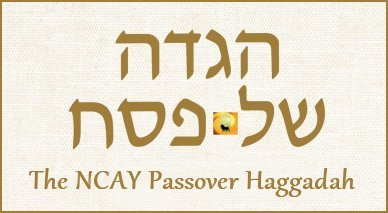
For more information about Pesach,
visit the Pesach/Passover website:



V257
|


